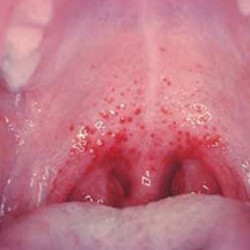
Strep throat is a bacterial infection which causes pain and inflammation in throat. Strep throat happens owing to the group A streptococcus bacteria. This condition affects both children and adults in different ages. Children from 5 to 15 tend to suffer from it more often than other age groups. These bacteria can be transmitted through the air as well as touch.
Basic Facts of Strep Throat
1. Causes of Strep Throat
Group A strep bacterium lives in the nose and throat. It spreads through moisture of those infected, such as coughing, sneezing,drinking or eating from the same dish used by an infected person.Additionally, you can become infected through exposure with sores or skin infections ofsomeone with strep throat.
2. Symptoms of Strep Throat
Symptoms typically show up in 5 days and the severity of your symptoms can vary. Strep throat symptoms commonly are sore throat (red throat with white patches), chills, headache, losing appetite, sudden fever, swollen neck (lymph nodes) and painful swallowing. But remember, not all sore throats are due to strep throat.
Note: If you or your child develops symptoms of strep throat, seek treatment, or if the symptoms persist for 24-48 hours after treatment, call your healthcare professional for further help.
Strep Throat Treatments
1. Prescriptions
If you are diagnosed with strep throat, your doctor will probably prescribe an oral antibiotic. There are two frequently used drugs for strep throat.
Penicillin is usually given orally, but can be given as an injection for situations where swallowing may be a problem, or if you or your child is frequently vomiting.
Amoxicillin that is in the same family as penicillin is, but often preferred for children, because it tastes better and is available as a chewable tablet.
If you are allergic to penicillin, your doctor may prescribe Keflex, Clarithromycin (Biaxin), Azithromycin (Zithromax, Zmax) or Clindamycin. These help reduce complications, spreading to others and the severity of symptoms.
2. OTC Treatments
Your doctor may also suggest Ibuprofen (Advil, Motrin IB, others), or Acetaminophen (Tylenol, others) for pain relief. Because of the risk of Reye’sSyndrome, young children and teenagers should not be given aspirin. Follow directions on the container or ask your doctor or pharmacist if you are uncertain about usage.
3. Surgery
Your doctor may recommend you to take a surgery to get your tonsils removed if strep throat recurs too often.The surgery should be considered when:
- You have recurring episodes of strep throat in a year even if you received antibiotic treatment.
- There are abscesses around the tonsils that do not respond to treatment.
- You continuously have bad taste or bad odor in the mouth which occurs due to tonsillitis
- Biopsy is needed to evaluate the tumor on the tonsil.
Tonsillectomy is often performed to remove the tonsils. The presence of abscess on the tonsils is treated by having a small incision to drain the abscess, though in some cases removing the tonsils is more appropriate. General anesthesia is needed for children who are going to have tonsillectomy while adults may only require local anesthesia.
After surgery, the volume and the sound of the voice is affected. You may observe bad breath some days. And there is minimal risk of bleeding after the procedure as well.
4. Home Remedies
Often, strep throat will not turn into too severe a problem to deal with; some great home remedies can simply soothe your symptoms.
|
Home Remedy |
Description |
|
Have Enough Rest |
Sleep helps you fight infection. You should stay home for at least the first 24 hours after starting antibiotics. |
|
Drink Water |
Get plenty of water. Keeping your throat moist will make swallowing easier, and the fluid should keep dehydration away. For children, you might add in some flavoring or allow some soda if it doesn't hurt to swallow. |
|
Eat Something |
Cold foods may feel good on the throat.Easy to swallow foods such as non-creamy soups, applesauce, mashed potatoes and soft cooked eggs are better. Avoid spicy or acidic foods. Also,try to avoid milk products as they actually help the strep bacteria to thrive. |
|
Gargle |
Frequent gargling of warm salt water will soothe your throat. Salt also makes it harder for the bacteria to thrive. Dissolve ¼ teaspoon of salt to 8 oz. of water. Spit out water after gargling with it. |
|
Add Moisture |
Use a cool-mist humidifier. This helps keep your nose and throat moist for healing and comfort. Clean your humidifier daily.Saline nasal sprays can also help keep the area moist. |
|
Avoid Irritants |
Steer clear of cigarette or other smoke, harsh chemicals, paintor cleaning products. |
|
Be Low-Key |
Plan easy tasks or play. You are going to be tired while you recover since your body is focused on healing. Watch a movie, read a book or take a nap.It’s all good. |